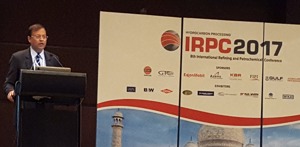IRPC '17: Indian Oil Chairman sees "enormous potential" for refining sector
By Adrienne Blume, Executive Editor
NEW DELHI, INDIA—Kicking off International Refining and Petrochemical Conference (IRPC) 2017, B. Ashok, Chairman of state-run Indian Oil Corp. (IOC), presented a keynote speech on the expansion of the Indian refining sector and the challenges and opportunities faced by Asia-Pacific refiners.
"Today, as India stands poised to drive global economic growth, the oil sector is set to grow manifold," Mr. Ashok said. However, he also noted that Indian demand per capita will remain at 40% below the worldwide per-capita average, as many Indians still lack access to clean, modern energy.
Indian refining sector set for huge growth. India is already a major refining hub and has "enormous potential" for expansion, the Chairman noted. The Indian government aims to reduce its dependence on oil and gas imports by 2022. To meet this goal, Mr. Ashok said, "We should not go slow on new capacities—we need many brownfield and greenfield projects."
Mr. Ashok also spoke of the need to "analyze gaps in the refining industry and take action to solve them." These gaps include technology improvements, energy efficiency opportunities and cleaner fuels production, among others.
Alongside India, major refining capacity additions will be concentrated in China and the Middle East, Mr. Ashok said. IOC expects global demand for oil products in 2040 to expand to 94 MMbpd.
Indian government plans call for the construction of highly integrated refining and petrochemical complexes with Nelson complexity factors as high as 15, he noted.
Substantial investment will be needed to set up world-scale refineries. These new plants will need to have flexibility in operations and capabilities for exports, and they must meet national and global demand and specifications for transportation fuels, the Chairman noted.
Refiners eye tightening fuel specs, world-scale projects. Other issues that refiners must address are product quality and environmental performance. Refineries in India, as well as around the world, are upgrading to meet product specs. "In recent years, even emerging and developing nations have stricter fuel specifications," Mr. Ashok said. "Refineries are evolving from simple to complex."
The Indian government has mandated a move from Bharat Stage 4 fuel specs to Bharat Stage 6 specs by April 2020, skipping the previously proposed Bharat Stage 5. The Bharat Stage 6 specs are equivalent to Euro 6 fuel specs.
The IOC Chairman also is pushing for new refinery and petrochemical projects to be commissioned in less than five years. Tighter time lines will help meet Indian's growing oil product demand, which IOC expects to increase from 183 MMtpy to 458 MMtpy by 2040.
India will set up huge refining capacities in both the public and private sector to meet this growing demand. To this end, a large, integrated refinery and petrochemicals complex is being built on India's West Coast by a partnership of Indian Oil Corp., Bharat Petroleum Corp. Ltd. and Hindustan Petroleum Corp. Ltd.
Government, industry shine spotlight on public health. Mr. Ashok next spoke about initiatives by oil marketing companies to help people in rural communities who do not have access to clean or modern energy.
In particular, women and children suffer from health complications caused by burning wood and kerosine for cooking and other household tasks. Air pollution, prominent in India's large cities, also is a concern in rural communities.
Access to clean, modern energy for these populations is imperative, the Chairman said. The government plans to help rural populations that still rely on these traditional fuels and are suffering from health issues because of air pollution. "We will get them access to modern fuels," Mr. Ashok asserted.
The establishment of LPG delivery connections provides a new source of fuel that shortens the time spent on cooking and household maintenance, thereby enhancing the productivity of income-generating work, Mr. Ashok explained. It also exposes rural populations to less smoke and decreases deforestation.
Kerosine use is decreasing as electricity use expands to more areas. Some states, such as Haryana, have been declared "kerosine free," the Chairman said.
"This is a social transformation project," Mr. Ashok said. "We are in a business where we are not only making money, but we are also bringing about social change … We are providing clean energy and affordable energy. We are changing the world."
Of course, initiatives to reduce kerosine use do pose a problem for the Indian refining industry. Refiners will need to find alternative uses for their kerosine production, such as pipeline-compactable kerosine and interface splitters. As kerosine demand further decreases, refineries will need to tailor kerosene production to evolving demand patterns and find other outlets for the fuel, Mr. Ashok said.
India invites world to its industry expansion. In conclusion, the IOC Chairman returned to his opening theme of India's high potential for growth. "We invite people from outside India to set up. This is an area for tremendous growth. Companies from abroad are invited to come in and play their bit in the growing Indian refining industry."
Mr. Ashok noted that a huge customer base awaits potential investors. "India remains committed to securing growth and energy for its 1.25 billion customers," he said.
IRPC 2017 is taking place at the Taj Palace in New Delhi from April 18–20.








Comments